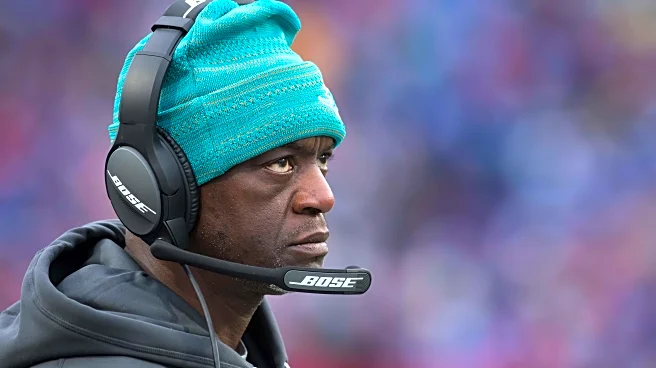What's Happening?
Lenny Wilkens, a celebrated NBA Hall of Fame player and coach, passed away at the age of 88. Wilkens died peacefully at his home, surrounded by family, as reported by Chris Daniels of KOMO News. His career in basketball was marked by significant achievements,
including being drafted sixth overall in the 1960 NBA draft by the St. Louis Hawks. Wilkens played for several teams, including the Seattle SuperSonics, where he also served as head coach starting in 1969. He led the SuperSonics to their first and only NBA championship in 1979. Wilkens' career spanned 15 years as a player, during which he averaged 16.5 points and 6.7 assists per game, earning nine NBA All-Star selections. His coaching career included stints with the Cleveland Cavaliers, Atlanta Hawks, Toronto Raptors, and New York Knicks.
Why It's Important?
Lenny Wilkens' passing marks the end of an era for the NBA and the city of Seattle. As a player and coach, Wilkens significantly contributed to the sport, particularly with his leadership in securing Seattle's only NBA championship. His influence extended beyond his playing days, impacting teams across the league through his coaching roles. Wilkens' legacy is a testament to his skill and dedication to basketball, inspiring future generations of players and coaches. His contributions to the sport have left a lasting impact on the NBA community and the cities he represented.
What's Next?
The NBA community is likely to honor Wilkens' legacy through tributes and memorials. His passing may prompt reflections on his contributions to the sport and discussions about his influence on basketball's development. Teams he coached, such as the SuperSonics, Cavaliers, Hawks, Raptors, and Knicks, may hold commemorative events to celebrate his life and career. The city of Seattle, in particular, may see renewed interest in its basketball history, given Wilkens' pivotal role in its championship win.
Beyond the Headlines
Wilkens' career highlights the evolution of basketball coaching and the impact of player-coaches in the NBA. His dual role as a player and coach with the SuperSonics exemplifies a unique era in basketball history. Wilkens' ability to transition from player to coach and lead a team to a championship underscores the importance of leadership and adaptability in sports. His story may inspire discussions on the role of mentorship and leadership in athletic success.















